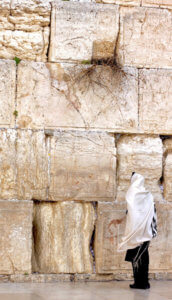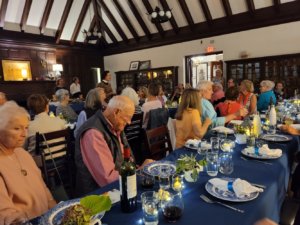
The Habit of Faith
What is faith? The Merriam-Webster dictionary tells us that faith is to believe that someone — or something — deserves to be trusted. The word faith is derived from the Latin word fides, which we hear in the motto of the US Marine Corps — Semper Fi, for fidelis, meaning Always Faithful! We want products or people we connect with to be bona fide — in good faith — meaning they are what, or who, they purport to be. Think of the English words we use related to faith — fidelity, as in loyalty between married people. And fiduciary, someone who acts on behalf of another, putting the other’s interests ahead of their own, with a duty to preserve good faith and trust.
 Faith, according to the letter to the Hebrews, is the assurance of things hoped for and the conviction of things unseen. In other words, faith is confidence, which is a behavior — an attitude, a discipline, a way of interacting in the world, and a habit. Our readings today are all about faith, and all about women — the mothers and the grandmothers — who build and nurture faith as character. Now, guys — God does not mean for these passages with lots of female imagery from the Hebrew Bible, the psalms, and the New Testament to exclude, erase, or deny the important role of men in families and societies. In fact, men have plenty of play in most of the pages of scripture, and you’ll have your day in the sun again. Today is Ladies’ Day.
Faith, according to the letter to the Hebrews, is the assurance of things hoped for and the conviction of things unseen. In other words, faith is confidence, which is a behavior — an attitude, a discipline, a way of interacting in the world, and a habit. Our readings today are all about faith, and all about women — the mothers and the grandmothers — who build and nurture faith as character. Now, guys — God does not mean for these passages with lots of female imagery from the Hebrew Bible, the psalms, and the New Testament to exclude, erase, or deny the important role of men in families and societies. In fact, men have plenty of play in most of the pages of scripture, and you’ll have your day in the sun again. Today is Ladies’ Day.
Faith is Built in Families
The point of this female imagery is to draw our attention to what the behavior and discipline of faith is, and where that attitude and character is formed and nurtured. You don’t build the habit of faith — or draw it, form it, invent it, or make it all on your own, like a poetic hero or an explorer. Faith — as an attitude, an element of character, and a kind of self-discipline — is built in families, whether born, made, or chosen. Faith is built with and through others as a way of being in community. Faith is a group project, built and nurtured so that it’s there when you need it, an autonomic response like our reflex to breathe.
At The Westminster Schools in Atlanta, the children in the elementary school sing, Character is who you are when nobody else is looking. I know faith building as a habit happens in every context, and Westminster — the school that Jere attended, and then taught in and led for over 30 years and our kids attended from elementary through high school — is my context and reference point for that self-discipline.
 We don’t know for sure who wrote the letter to the Hebrews with this description of faith. Many scholars think it was the Apostle Paul, or maybe Apollos. My favorite scholarly theory is that Priscilla wrote the letter to the Hebrews. Priscilla and her husband Aquila were Jews, like Jesus and like Paul, who became early leaders in the church. I like to think that Priscilla wrote the letter to the Hebrews containing that description of faith — the assurance of things hoped for and the conviction of things unseen — to remember that women have always been as active in the church as they are today, even though their presence and leadership are not often emphasized in Christian teaching. Even so, scripture, most especially in our readings this morning, is filled with women — and feminine imagery — although not all of it positive. The Lamentations reading describes Jerusalem as a woman, once confident and connected but now, with her citizens in exile, she is abandoned and abused.
We don’t know for sure who wrote the letter to the Hebrews with this description of faith. Many scholars think it was the Apostle Paul, or maybe Apollos. My favorite scholarly theory is that Priscilla wrote the letter to the Hebrews. Priscilla and her husband Aquila were Jews, like Jesus and like Paul, who became early leaders in the church. I like to think that Priscilla wrote the letter to the Hebrews containing that description of faith — the assurance of things hoped for and the conviction of things unseen — to remember that women have always been as active in the church as they are today, even though their presence and leadership are not often emphasized in Christian teaching. Even so, scripture, most especially in our readings this morning, is filled with women — and feminine imagery — although not all of it positive. The Lamentations reading describes Jerusalem as a woman, once confident and connected but now, with her citizens in exile, she is abandoned and abused.
Jerusalem is lonely … like a widow.
Once … a princess among the provinces,
She weeps bitterly in the night,
she has no one to comfort her… .
Casting Jerusalem as a grieving mother in the passage tugs on our tenderest sympathies, recalling both our need for love when we were children, and the love we pour out on our own children:
her young girls grieve, and her lot is bitter.
her children have gone away,
captives before the foe.From daughter Zion has departed
all her majesty.
 As religious studies professor Kristin Swenson observes, This is grief articulated out of the chaos of great destruction and expressed in the voice of an unwavering faith desperately seeking understanding. And it’s grief that is expressed, and shared, and nursed, and healed through connection in community. The Book of Lamentations is made up of page after page of deeply expressed pain, isolation, and woe, and it’s the very crying out and naming of what is badly wrong, or sad, or scary, or uncertain that pulls us together onto common ground.
As religious studies professor Kristin Swenson observes, This is grief articulated out of the chaos of great destruction and expressed in the voice of an unwavering faith desperately seeking understanding. And it’s grief that is expressed, and shared, and nursed, and healed through connection in community. The Book of Lamentations is made up of page after page of deeply expressed pain, isolation, and woe, and it’s the very crying out and naming of what is badly wrong, or sad, or scary, or uncertain that pulls us together onto common ground.
Psalm 137 is brutal, drawing us into the lives of mothers in exile by the waters of Babylon, holding hands and weeping together, grieving for their lost children, for their grim present, as they reach for their barely glimpsed, reconciled future. It’s rough, expressing the pain of their own loss in the most shocking and poignant way to engage each other — and us — in the depth of their pain with the awful image of dashing children agains the rocks. I don’t hear this as a desire for revenge or violence, but rather as the sharing of grief so deep that it can’t help but draw us in, building empathy and focusing our attention on the great love underlying it, seeking right.
Faith as a Way of Life
Paul’s letter to Timothy also grounded in the tender faithfulness of a mother’s love as he writes of faith as a way of life, even though the letter was written by Paul, who as best we know was an unmarried, childless man. Paul’s nurturing, maternal role with faith — and with Timothy — is further emphasized by Timothy’s attitude of faith, built and nurtured by his mother and grandmother, whom Paul carefully names. He writes,
To Timothy, my beloved child:
I am grateful to God
— whom I worship with a clear conscience, as my ancestors did
— when I remember you constantly in my prayers night and day …
I am reminded of your sincere faith, a faith that lived first in your grandmother Lois and your mother Eunice and now, I am sure, lives in you.
For this reason I remind you to rekindle the gift of God that is within you …
for God did not give us a spirit of cowardice,
but rather a spirit of power and of love and of self-discipline.
 Paul reminds us that sincere faith like that is confidence — which is a behavior, a self-discipline, an attitude, and a habit. And Luke’s gospel reminds us that with that habit of faith — even faith the size of a mustard seed — you can accomplish absolutely anything.
Paul reminds us that sincere faith like that is confidence — which is a behavior, a self-discipline, an attitude, and a habit. And Luke’s gospel reminds us that with that habit of faith — even faith the size of a mustard seed — you can accomplish absolutely anything.
How do we build this habit of faith? How can faith become our self-discipline? We can start with the scriptural basics, the Habits of faith, built in families — whether born, chosen, or made — and in community. Faith is not, as the Red Queen said in Lewis Carroll’s Through the Looking Glass, “Believing 15 impossible things every day before breakfast.” It’s the habit, the disciples, of remembering who and whose we are, and interacting with others from that place.
First, we can meet each other across difference with an attitude of curiosity. We can develop a self-discipline of being present with each other, to reimagine our own understandings, listening for each other’s truth, perspective, and lived experience instead of rigidly defending our own. We can engage in hospitality, literally the love of what is strange to, or different from, us. And we can lament — naming and grieving what is wrong or sad or scary, drawing together onto common ground.
 We practiced this in the Library Wednesday night at the Can You Hear Me Now community dinner, raising funds for Emmanuel’s new sound system. While the Library looked beautiful, and the food was amazing, the highlight of the evening was getting to know Emmanuel newcomers and renewing old and dear connections with people who were baptized and confirmed, sang in the choir, or married at Emmanuel many years ago, and found this opportunity to reconnect with the community.
We practiced this in the Library Wednesday night at the Can You Hear Me Now community dinner, raising funds for Emmanuel’s new sound system. While the Library looked beautiful, and the food was amazing, the highlight of the evening was getting to know Emmanuel newcomers and renewing old and dear connections with people who were baptized and confirmed, sang in the choir, or married at Emmanuel many years ago, and found this opportunity to reconnect with the community.
We met each other from all our different backgrounds and perspectives with curiosity, hospitality, and shared interest in good food, great conversation, and the community we’re building at Emmanuel. As Paul wrote in love to Timothy, keep your good habits. Be confident. Hold to the standard of sound teaching that you have heard from me, in the faith and love that are in Christ Jesus. Guard the good treasure entrusted to you, with the help of the Holy Spirit living in us. Amen
